

Before FICO, credit bureaus relied in part on gossip culled from people’s landlords, neighbors, and local grocers. Their chief innovation was using computer-driven statistical analysis to translate people’s personal details and financial history into a simple score, predicting how likely they were to pay back loans. They named it Fair, Isaac and Co., but the business eventually came to be known, for short, as FICO. In 1956 an electrical engineer named Bill Fair and a mathematician named Earl Isaac started a small tech company out of a San Francisco apartment. It was as if Amazon had swallowed eBay, Apple News, Groupon, American Express, Citibank, and YouTube-and could siphon up data from all of them. If he wanted to, he could access Airbnb, Uber, or Uber’s Chinese rival Didi, entirely from inside Alipay. Some of the icons were themselves full-blown third-party apps. Whenever Liu opened Alipay on his phone, he saw a neat grid of icons that vaguely resembled the home screen on his Samsung. Alipay and WeChat are less like individual apps than entire ecosystems.

Its main competitor, WeChat, belongs to the social and gaming giant Tencent. Owned by Ant Financial, an affiliate of the massive Alibaba corporation, Alipay is sometimes called a super app. But Alipay knows all of these things about its users and more. Uber knows where you go and how you behave en route. Facebook knows if you like Tasty cooking videos or Breitbart News. Credit card companies know when you run up bar tabs or buy sex toys. If you live in the United States, you are by now accustomed to relinquishing your data to corporations. Like many young Chinese who had become enamored of the mobile payment services offered by Alipay and WeChat, Liu stopped bringing his wallet when he left the house.

He could have paid his electricity, gas, and internet bills in Alipay’s City Service section. He stored whatever money was left over, which wasn’t much once the vacation and car were paid for, in an Alipay money market account. When Liu went on vacation with his fiancée (now his wife) to Thailand, they paid at restaurants and bought trinkets with Alipay. He added friends in Alipay’s built-in social network.

He booked doctors’ appointments there, skipping the chaotic lines for which Chinese hospitals are famous. He started making his car insurance payments with the app.
China tracking and scoring citizens license#
He realized that he could pay for parking through Alipay’s My Car feature, so he added his driver’s license and license plate numbers, as well as the engine number of his Audi. Alipay’s slogan summed up the experience: “Trust makes it simple.”Īlipay turned out to be so convenient that Liu began using it multiple times a day, starting first thing in the morning, when he ordered breakfast through a food delivery app. Alipay had built a reputation for reliability, and compared to going to a bank managed with slothlike indifference and zero attention to customer service, signing up for Alipay was almost fun. To get an Alipay ID, Liu had to enter his cell phone number and scan his national ID card. One day, at a vegetable market, he watched a woman his mother’s age pull out her phone to pay for her groceries. Cash, Liu could see, had been largely replaced by two smartphone apps: Alipay and WeChat Pay. At McDonald’s, the convenience store, even at mom-and-pop restaurants, his friends in Shanghai used mobile payments. In 2015, when Lazarus Liu moved home to China after studying logistics in the United Kingdom for three years, he quickly noticed that something had changed: Everyone paid for everything with their phones.


 0 kommentar(er)
0 kommentar(er)
